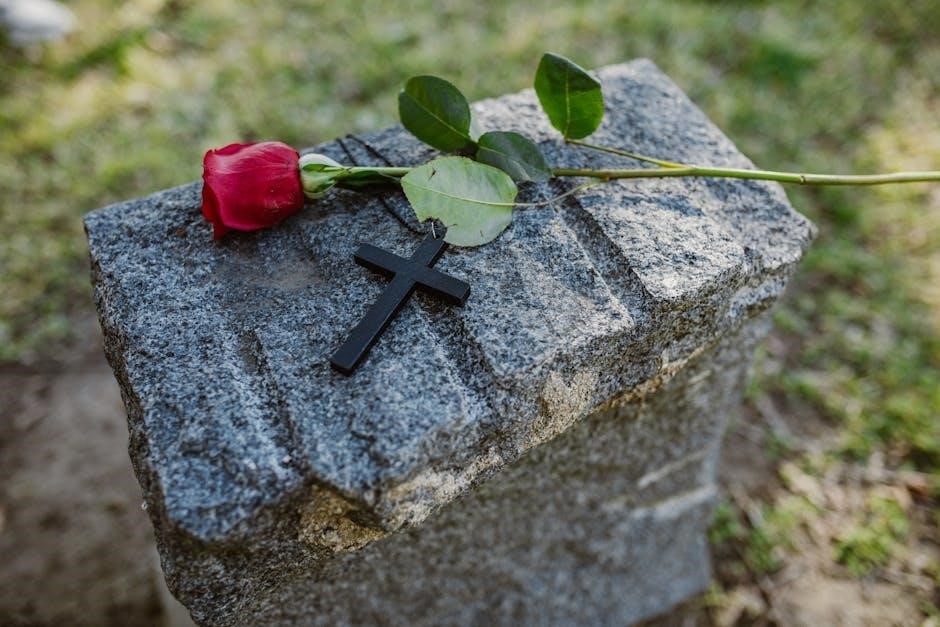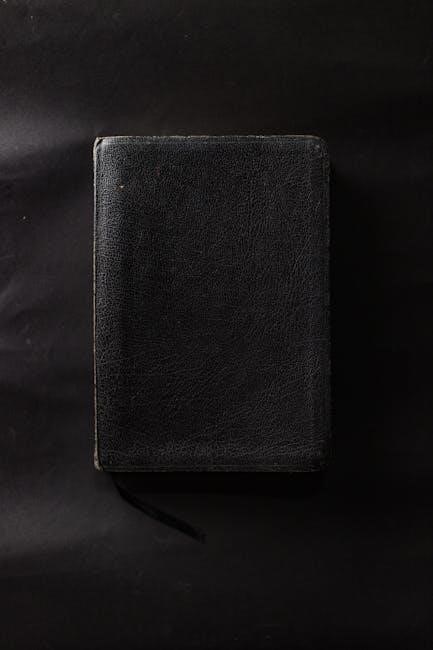The Order of Christian Funerals is a liturgical document guiding Catholic funeral rites, providing structure for mourning and celebrating the deceased’s life while offering hope through faith in the resurrection.
Overview of the Document
The Order of Christian Funerals is a comprehensive liturgical document that outlines the rites and prayers for Catholic funeral liturgies. It serves as a guide for celebrating the life of the deceased while expressing hope in the resurrection. The document is divided into sections, including the Vigil for the Deceased, the Funeral Mass, and the Rite of Committal, ensuring a structured approach to mourning. It also addresses special circumstances, such as cremation, and provides options for non-Catholic participants. The Order of Christian Funerals emphasizes the importance of prayer and community support for the bereaved, offering a meaningful way to honor the deceased and comfort those who grieve. Its purpose is to provide a dignified and faith-filled celebration of life, rooted in Catholic tradition and liturgical practice.
Significance of the Order of Christian Funerals in Catholic Tradition
The Order of Christian Funerals holds profound significance in Catholic tradition as it provides a liturgical framework to honor the deceased, comfort the bereaved, and express faith in the resurrection. Rooted in Catholic teachings, it emphasizes prayer, ritual, and community support during mourning. The document ensures that funeral rites are conducted with dignity and reverence, reflecting the Church’s belief in the sanctity of life and the hope of eternal life through Christ. It also serves as a reminder of the Church’s commitment to caring for the spiritual well-being of both the deceased and their loved ones. By adhering to these rites, Catholics affirm their faith and find solace in the liturgy’s promise of eternal rest and mercy for the departed.
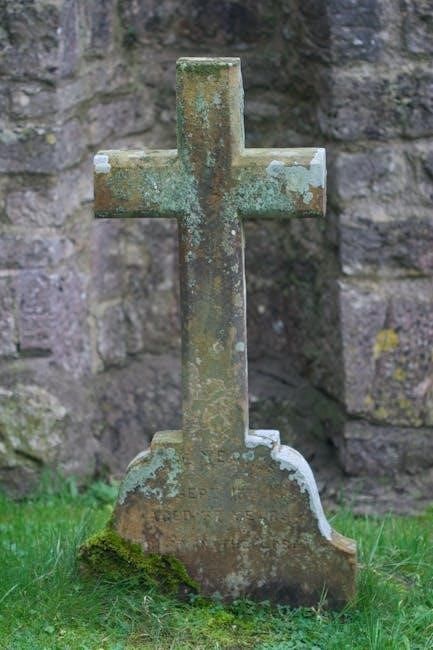
The Structure of the Funeral Rites
The Order of Christian Funerals outlines a structured approach, beginning with the Vigil for the Deceased, followed by the Funeral Mass, and concluding with the Rite of Committal, ensuring a dignified and meaningful celebration of life.
The Vigil for the Deceased
The Vigil for the Deceased is the first rite in the Order of Christian Funerals, typically held in a home, funeral home, or church. It is a time for family and friends to gather, pray, and remember the deceased through shared memories and scripture readings. The vigil often includes prayers, such as the Rosary, and may incorporate readings from the Bible to comfort the mourners. This rite emphasizes the community’s support for the bereaved and serves as a preparation for the Funeral Mass. The vigil also provides an opportunity to reflect on the deceased’s life and their faith journey, offering hope and consolation through prayer and shared faith. It is a meaningful way to begin the funeral rites, honoring the deceased while strengthening the community’s bond.
The Funeral Mass and Its Components
The Funeral Mass is the central rite of the Order of Christian Funerals, celebrating the resurrection of Christ and the eternal life promised to the deceased. It typically includes the Introductory Rites, Liturgy of the Word, Eucharistic Sacrifice, and the Rite of Final Farewell. The Mass is a powerful expression of faith, offering hope to the mourners and prayerful remembrance of the deceased. The Eucharist serves as a source of unity between the living and the deceased, reinforcing the belief in the communion of saints. Prayers and readings are chosen to reflect the life of the deceased and to seek God’s mercy for their soul. The Funeral Mass is a profound way to honor the deceased while comforting those who grieve, emphasizing that death is not the end but a transition to eternal life with God.
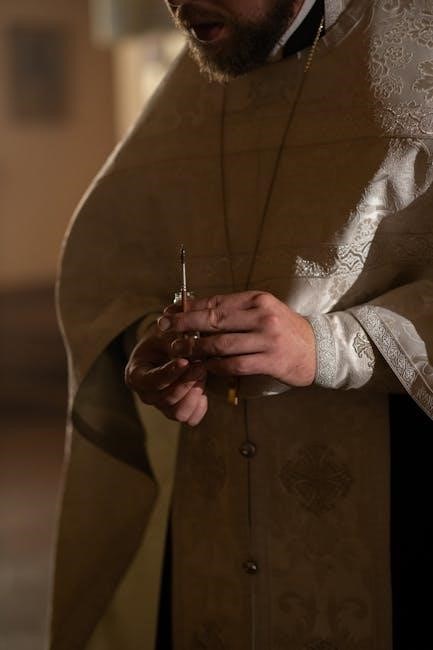
The Rite of Committal
The Rite of Committal is the final act of the funeral rites, conducted at the grave or mausoleum. It includes prayers, a blessing over the grave, and the commitment of the body to the earth. This rite expresses respect for the deceased and faith in the resurrection, providing a solemn conclusion to the funeral rites.
Prayers and Blessings at the Cemetery
The prayers and blessings at the cemetery are integral to the Rite of Committal, offering a final act of reverence and faith. These prayers, rooted in Catholic tradition, invoke God’s mercy and express hope in the resurrection. The priest typically sprinkles holy water on the casket or urn, symbolizing purification and baptismal renewal. Specific prayers from the Order of Christian Funerals are recited, emphasizing the belief in eternal life. The cemetery prayers also include a blessing over the grave, asking for God’s protection and peace for the deceased and their loved ones. These rituals underscore the Church’s teaching on the dignity of the human body and its sacredness as a temple of the Holy Spirit. The cemetery becomes a sacred space where the community gathers to bid farewell, trusting in the promise of eternal life.
The Importance of Burial in Catholic Teachings
Burial holds deep significance in Catholic teachings, reflecting respect for the body as a temple of the Holy Spirit. The Church emphasizes the dignity of the human body, even in death, and prefers traditional burial to honor this belief. While cremation is permitted, it is not the preferred method, and cremated remains should be buried or entombed, not scattered or kept in home urns. Catholic cemeteries are recommended to foster a sense of community and ensure the deceased are laid to rest in sacred ground. This practice underscores the Church’s teachings on the resurrection and the hope of eternal life, reinforcing the connection between the deceased, their families, and the broader Catholic community.
Special Considerations
The Catholic Church addresses cremation and funeral rites for non-Catholics, ensuring respectful accommodations while maintaining theological integrity and liturgical traditions, guided by compassion and pastoral sensitivity.
Cremation and the Catholic Church’s Stance
The Catholic Church permits cremation, though it traditionally prefers burial, reflecting reverence for the body as a temple of the Holy Spirit. Cremated remains must be treated with dignity, stored in a sacred place, and not scattered or divided. The Church emphasizes that cremation should not signify a denial of the resurrection or the soul’s immortality. Funeral rites for cremated remains follow the Order of Christian Funerals, allowing the urn to be present during the Funeral Mass. Families are encouraged to bury cremated remains in cemeteries or columbaria, ensuring respect for the deceased and continuity with Catholic tradition. This stance balances modern practices with enduring theological principles, providing pastoral guidance for grieving families while upholding the Church’s teachings on death and resurrection.
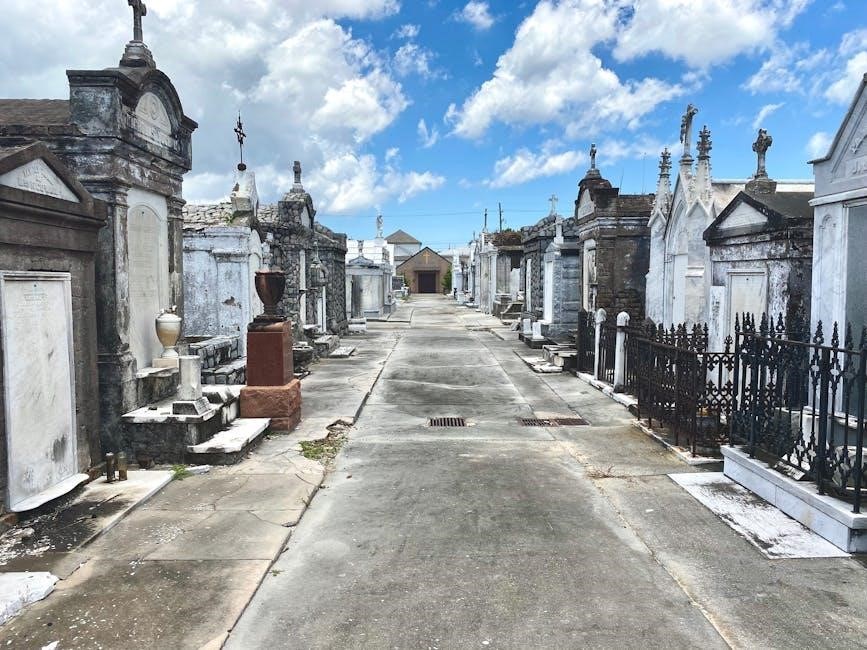
Funeral Rites for Non-Catholics and Their Families
The Catholic Church extends its funeral rites to non-Catholics, offering pastoral support to grieving families. While certain sacraments are reserved for Catholics, the Church allows baptized Christians and, in some cases, non-baptized individuals to receive funeral liturgies. These rites aim to provide comfort and hope, emphasizing prayer for the deceased and the consolation of their loved ones. The Order of Christian Funerals outlines specific guidelines, ensuring that the liturgy respects the non-Catholic’s beliefs while maintaining Catholic traditions. This inclusive approach reflects the Church’s mission to serve all people, offering a compassionate and dignified farewell to the deceased and spiritual support for their families during their time of loss and mourning;
The Role of the Church in Funeral Liturgy
The Church provides spiritual guidance and support during funerals, ensuring liturgies are conducted with dignity and compassion, offering prayerful assistance to the deceased and their families.
Prayers for the Deceased and Their Family
Prayers for the deceased and their family are central to the Catholic funeral liturgy, offering spiritual support and consolation. The Church provides specific prayers and rituals, such as the Eucharistic sacrifice during the Funeral Mass, to honor the deceased and seek eternal rest for their soul. These prayers also aim to comfort the grieving family, expressing hope in the resurrection and reunion with loved ones in heaven. The Order of Christian Funerals includes various collects, responsories, and intercessions, ensuring the deceased is remembered with dignity and compassion. Additionally, the Church encourages the faithful to pray for the deceased, emphasizing the importance of intercession and the communion of saints. Through these prayers, the Church upholds its mission to care for both the deceased and their loved ones during a time of sorrow and transition.
The Church’s Support for the Bereaved
The Catholic Church provides profound support for the bereaved through its liturgical rites and compassionate ministries. The Order of Christian Funerals emphasizes the importance of community and faith in comforting those who mourn. Prayers, rituals, and scriptural readings are designed to bring solace and hope, reminding the bereaved of Christ’s victory over death. The Church encourages active participation of family and friends in funeral liturgies, fostering a sense of unity and shared grief; Additionally, pastoral care and counseling services are often available to help individuals navigate their loss. The Church’s support extends beyond the funeral rites, offering ongoing spiritual guidance and communal prayer for the deceased and their loved ones. This comprehensive approach reflects the Church’s commitment to walking with the bereaved during their time of sorrow and transition.
The Order of Christian Funerals provides a meaningful way to honor the deceased while offering hope and consolation to the bereaved through faith in the resurrection.
Reflecting on the Purpose of Christian Funeral Rites
Christian funeral rites are designed to offer worship, praise, and thanksgiving to God for the life of the deceased. They provide a meaningful way to celebrate the life, faith, and love of the departed while offering hope and consolation to the bereaved. The rites aim to assist the deceased with prayers for their eternal salvation and to support the family and friends in their grief. Through the Mass, the memorial of Christ’s death and resurrection, the community gathers to find strength in faith and to remember the deceased with dignity and compassion. These rituals are a testament to the Church’s belief in the resurrection and eternal life, bringing comfort and hope to all who mourn.
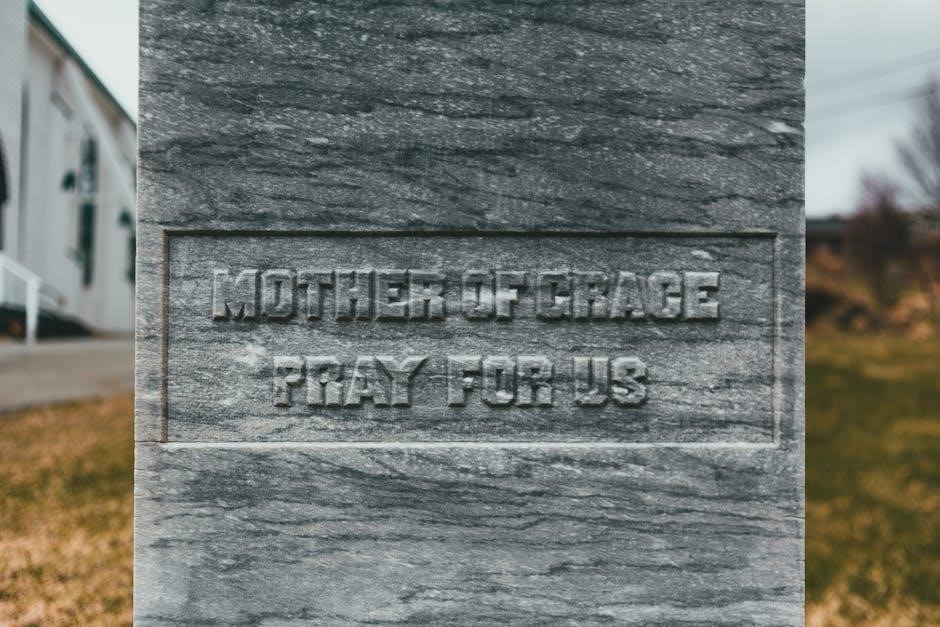
Final Thoughts on the Order of Christian Funerals
The Order of Christian Funerals serves as a profound expression of faith, hope, and love, guiding the Catholic community in celebrating the life of the deceased. It emphasizes the importance of prayer, ritual, and communal support during times of loss. By providing a structured framework for funeral rites, the document ensures that the dignity of the deceased is honored while offering consolation to the bereaved. The teachings reflect the Church’s belief in eternal life and the resurrection, bringing comfort to those who grieve. This sacred tradition not only upholds Catholic values but also strengthens the faith of the living, reminding them of God’s eternal promise and the unity of the Church in times of sorrow and joy.
